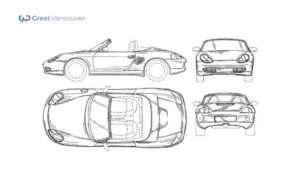The shift from fuel to electric cars is more than a fashion. It’s a movement for a purer, sustainable future. Buying a brand-new electric car (EV) is a large investment. So, many are thinking about converting their current cars to electric-powered cars. But what is the cost of electric car conversion? And is it well worth it in the end? Let’s explore the expenses, savings, and environmental benefits of electric automobile conversions.
Table of Contents
| Sr# | Headings |
|---|---|
| 1 | Introduction |
| 2 | Why Convert to Electric? |
| 3 | Understanding the Costs of Electric Car Conversion |
| 4 | Conversion Kit Costs |
| 5 | Battery Options and Prices |
| 6 | Labor and Installation Expenses |
| 7 | Additional Parts and Modifications |
| 8 | Vehicle Compatibility and Suitability |
| 9 | Pros and Cons of Electric Conversion |
| 10 | Saving Money in the Long Run |
| 11 | Environmental Impact |
| 12 | Common Challenges and Misconceptions |
| 13 | DIY Conversion vs. Professional Help |
| 14 | Government Incentives and Rebates |
| 15 | Conclusion: Is Electric Conversion Worth It? |
| 16 | FAQs on Electric Car Conversion Costs |
Why Convert to Electric?
Converting your gas vehicle to an electric one has its appeal. An electric-powered car has lower emissions. It can also save you on gasoline and renovation fees over time. Classic car proprietors can convert to electric power. It lets them preserve their favorite cars using green, modern technology.
Understanding the Costs of Electric Car Conversion
To convert a car to electric power, you want some key elements: a battery pack, an electric motor, and some connectors. The expenses can add up, but breaking them down helps you get a clearer image of what you’re procuring.
Conversion Kit Costs
A fundamental cost is the conversion package. It consists of the motor and different elements. Depending on the energy and performance you’re seeking, those kits can range from $1,000 to $10,000. High-end kits with advanced capabilities can be pricier. But, they offer more power and longer riding ranges.
Battery Options and Prices
The battery pack is usually the most highly priced part of an electric car conversion. It is additionally one of the most crucial. Battery costs can vary based on capacity, brand, and technology. A decent battery pack for an average conversion might cost $5,000 to $20,000. Opting for a higher potential battery can increase your range but may even raise the value.
Labor and Installation Expenses
Labor costs are another sizable factor. Some car fanatics may additionally strive to do the conversion themselves. But many choose to hire experts for the job. Labor costs can range from $1,000 to over $5,000. It depends on the vehicle and the complexity of the conversion.
Extra Parts and Modifications
You’ll also need various extra components. These consist of controllers, cooling structures, wiring, and adapters. These can add anywhere from a few hundred to more than one thousand bucks to the value. You may also need enhancements to the suspension or brakes. The design is meant to handle the added weight of the battery pack.
Vehicle Compatibility and Suitability
Not every automobile is a superb candidate for electric-powered conversion. Manual transmissions and lightweight frames are nice for performance. They need much less strength to function. If your automobile is not well-suited, it may need high-priced changes.
Pros and Cons of Electric Conversion
Pros:
Lower gasoline and renovation fees.
Reduced environmental effects.
Keep your current automobile even while going green.
Cons:
High upfront prices.
The limited range is based entirely on battery capabilities.
Potential compatibility issues with certain motors.
Saving money ultimately
An electric-powered car’s high conversion cost may additionally seem steep. But it may save you cash over time. Lower gas and upkeep prices make converted electric-powered vehicles a terrific investment. Many owners find they break even in some years due to rising fuel costs.
Environmental Impact
A large gain of converting to electricity is its superb impact on the environment. Electric cars produce zero emissions. They assist in lessening air pollution and the carbon footprint. For eco-aware drivers, this benefit alone could make the investment worthwhile.
Common Challenges and Misconceptions
Many worry that an electric car conversion will leave them stranded. They worry about a lack of charging stations and a limited driving range. These issues are comprehensible. But battery tech and charging stations have made EVs more reliable.
DIY Conversion vs. Professional Help
Some automobile fans enjoy the mission of converting a car themselves. But most people discover it less complicated to paint with a pro. DIY conversions are workable. But they need mechanical skill, time, and special gear. When you hire a professional, you make sure that they complete the job with safety and accuracy.
Government Incentives and Rebates
Many governments offer incentives for electric vehicle conversions. These can reduce costs. Check neighborhood, state, or federal packages. You may also qualify for monetary resources for your conversion project.
Conclusion
The cost of electric car conversion is a lot in advance. But it may save money, help the environment, and provide you with peace of mind. For many drivers, those benefits make it well worth it. If you need to reduce your carbon footprint, consider an electric-powered vehicle conversion. It helps you maintain driving your modern car.
FAQs on Electric Car Conversion Costs
Q. How much does an electric car conversion typically cost?
Converting a car to electric usually costs $10,000 to $25,000. It depends on the vehicle and the parts chosen.
Q. Can any car be converted to electric?
Most cars can be converted. But, vehicles with manual transmissions and lightweight frames are best.
Q. How long does the conversion process take?
A pro conversion takes a few weeks. A DIY project can take months, depending on your skills and time.
Q. Are there government incentives for electric car conversions?
Yes, many governments offer incentives or rebates to encourage electric conversions. Check with local or national programs to see if you qualify.
Q. Will converting to electric reduce my car’s range?
The range will depend on the battery pack you choose. Some gas vehicles have a longer range. But battery tech is improving the EV range.
If you enjoyed this, you might also like these:
Eco-Friendly Adventures How Sustainable Tourism Benefits You and the Planet
Discover Vancouver’s Charm Must-See Sights for Every Traveler








